Reply To:
Name - Reply Comment
Last Updated : 2024-04-18 08:56:00
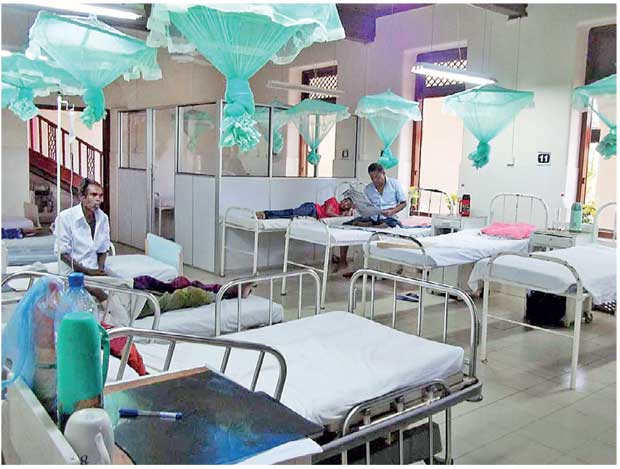
 When a patient enters into one of our government hospital’s their first question would be, “will I get a bed?” The demand for medical facilities is such that the term ‘floor patients’ has become a common term, even outside the world of medical jargon. Where there is overcrowding, there are distressed patients. Therefore, patients who are in need of beds are greatly inconvenienced and stressed, further contributing to the worsening of their medical condition and mental state. It effects the dignity of the patient as well. Over-crowded wards have many consequences: patient safety, as falls from beds, mixing up of patients blood reports with other tests and loss of medical records. Overcrowding can also lead to anger and frustration among both patients and staff leading to aggressive behaviour and even physical confrontations. This also affects the efficient running of a ward, as doctors, nurses and other medical staff are over worked. They find it difficult to organize themselves to deliver care more efficiently. Many would consider that the lack of hospital beds would mean that the demand of beds does not correspond with the supply of hospital beds. Though this is true to some extent, the key reason for the lack of beds is because of the inefficient use of existing resources. There are other factors contributing to this predicament as well, such as the absence of referral systems in hospitals, unnecessary admissions, and lack of physical resources and in some cases preferential treatment.
When a patient enters into one of our government hospital’s their first question would be, “will I get a bed?” The demand for medical facilities is such that the term ‘floor patients’ has become a common term, even outside the world of medical jargon. Where there is overcrowding, there are distressed patients. Therefore, patients who are in need of beds are greatly inconvenienced and stressed, further contributing to the worsening of their medical condition and mental state. It effects the dignity of the patient as well. Over-crowded wards have many consequences: patient safety, as falls from beds, mixing up of patients blood reports with other tests and loss of medical records. Overcrowding can also lead to anger and frustration among both patients and staff leading to aggressive behaviour and even physical confrontations. This also affects the efficient running of a ward, as doctors, nurses and other medical staff are over worked. They find it difficult to organize themselves to deliver care more efficiently. Many would consider that the lack of hospital beds would mean that the demand of beds does not correspond with the supply of hospital beds. Though this is true to some extent, the key reason for the lack of beds is because of the inefficient use of existing resources. There are other factors contributing to this predicament as well, such as the absence of referral systems in hospitals, unnecessary admissions, and lack of physical resources and in some cases preferential treatment.
The Daily mirror investigated on this matter further and detected the reasons and possible solutions to the issue of the lack of beds in state funded hospitals.
Efficient use of existing resources 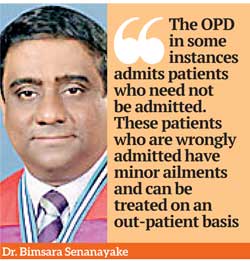
Dr Amitha Fernando, spoke specifically in regards to the resource allocation of existing facilities in hospitals, “The demand at a particular time is such that resources are overwhelmed, patients have to, in some instances, spend the night on benches, share beds or sleep on mats on the floor.
The question is whether there is real overcrowding, or whether hospitals are using their existing resources efficiently. For example if there are 1000 beds in the hospital, in most instances it is highly unlikely that all beds would be occupied at the same time. There are instances where some wards are busy while some wards are not, and at times these idle wards may be even closed because consultants work on a roster system. These closed wards have extra empty beds; however there is no one to allocate patients who are in dire need of beds, to those beds.”
He added, “It is sad to see that there is no access to available beds on the off days of doctors. We need to truly ask the question: who owns the beds in government hospitals? The public ? Or is it the temporary custodian of the ward? We need to change the mentality of consultants who are rather territorial in regards to their wards. They need to understand that the beds belong to the patients. They should help allocate government resources efficiently as they are accountable to the people. The consequence of this restriction to beds is: floor patients and sick children, and even adults in some circumstances, sharing beds.”
He spoke on other problems that should be addressed in addition to efficient resource allocation, “There are also other issues such as unnecessary admission of patients and where most patient by-pass their local village hospitals and admit themselves to the bigger central hospitals for minor ailments. Though these are reasons for lack of beds in hospitals, the key reason is the inefficient allocation of existing resources. Remedying the main problem, should be the primary focus of all hospitals.”
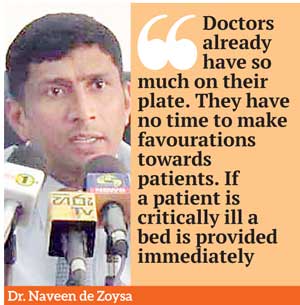
Preferential treatment
GMOA (Government Medical Officers Association), Assistant Secretary Dr. Haritha Aluthge, spoke on how the difficulties in managing the units of the OPD (Out Patient Department - It is the section of the hospital where patients are provided medical consultations) and preferential treatment are contributing factors to the lack of beds in government hospitals. He said, “The government sectors are always overcrowded with patients. The priorities for beds go for the critically ill patients. However, through various means of the media it can be observed that some patients would be put on top of the priority list, if they have the influence of a doctor. This should not be so, everybody must be treated equally. But for equal treatment facilities must be provided.
When we take the OPD unit for instance, the normal practice in other countries is that the doctor examines the patient for 5-10 minutes. However, in Sri Lanka though the salaries of doctors in the government sector are extremely subsidized, the doctor examines the patient for around 4 hours in the OPD. This requires a bed for the patient, and thus creates overcrowding. State doctors also see more than 100-150 patients daily. This is not practical. Since we do not have enough qualified doctors and we lack in facilities for the ever growing number of patients, the lack of beds in hospitals is an inevitable problem.”
He said as a solution to this issue, “There should be HR development in our country, to increase the number of doctors and nurses in hospitals, and the government should allocate enough funds for there to be facilities in hospitals.
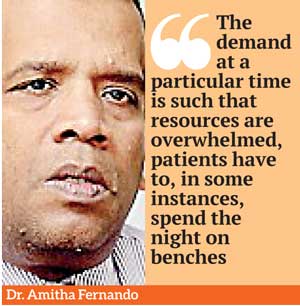
However, the Media Spokesperson representing the GMOA Dr. Naveen De Zoysa has a different perspective on the preferential treatment in hospitals. He said, “This does not happen, doctors already have so much on their plate. They have no time to make favourations towards patients. If a patient is critically ill a bed is provided immediately. There have never been cases of patients who are critically ill on the floor. We prioritize according to the illness.”
Government Aid
Dr. Naveen, spoke on the government’s perspective with regard to this predicament, “We need to conduct a need assessment to actually see the shortage of beds, to the demand of patients. But what we need to truly focus on is not the supposed lack of beds in hospitals, but the quality of service that the doctors provide to the patients. The main stakeholder in this situation is the government; it is their duty to provide all facilities to cater to the need of the public. The GMOA was particularly against the budget proposals, because the budget for health services had been reduced in contrast to last year. Ravi Karunayake even stated that he wanted to introduce a health insurance scheme. This is a detriment to the public because the private sector will be getting involved in our fully free, state service of health. Other countries look at our state health service as a model for theirs. Instead of reducing the budget of the costs of the health sector, the government must prioritise on improving it. We need to look at the lack of beds issue as a whole. The government needs to allocate more money for this problem to be eradicated.”
We asked if the GMOA, has made any claims to the government to increase the bed facility in hospitals, “We do not only demand beds, we demand all facilities. We work very hard in doing so.”
Unnecessary admissions 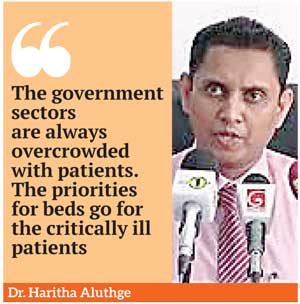
Dr. Bimsara Senanayake, Consultant Neurologist of the National Hospital, spoke on how the absence of a referral system leads to overcrowding in hospitals. A referral can be defined as a process where a health worker at one level of the health system, will refer the patient to a differently resourced facility, due to insufficient resources. But, we do not have a system where General Practitioners refer patients to government hospitals, by informing the hospital about the patient.
He said, “In government hospitals the OPD in some instances admits patients who need not be admitted. These patients who are wrongly admitted have minor ailments and can be treated on an out-patient basis. Therefore, they will be unnecessarily occupying beds. There has to be a system where a patient should be evaluated in an emergency treatment unit (ETU). The ETU is also called the PCU (Preliminary Care Unit) in Sri Lankan hospitals. There is a PCU unit at the LRH (Lady Ridgeway hospital), where patients are triaged before being sent to the PCU or the OPD.”
A consultant Paediatrician of the PCU of the LRH ( Dr. Kosala Karunaratne) elaborated on the functions of the PCU, and how it reduces unnecessary admission in hospitals. He said, “ Before the patient enters into the PCU of the LRH they are triaged by nurses at the entrance of the hospital. Triaging is sorting out ill patients from relatively well patients. The Triage nurse will decide if the patient should either go to the PCU or the OPD. We want to go further and use a scoring system, where the nurses score the children based on their vital signs. This is basically a traffic light system, where the red and the yellow patients come to the PCU while the green patients go to the OPD. From the OPD the child would be able to go home after his consultation. If the patient is sent to the PCU he will be observed for a maximum of 4 hours, and thereafter it will be decided if the child has to be sent home or admitted. The triaging system facilitates in the efficiency of managing and directing the patients. Therefore, the system reduces overcrowding in hospitals. But we need to develop the triage system further, where we can use resources more efficiently and save time.”
Dr. Bimsara further stated, “The emergency treatment unit (ETU) and the OPD are two contrasting units. The OPD is where minor ailments are examined, for instance coughs and colds. The ETU is a treatment unit where the patient is examined before admission. The doctors who are at the ETU decide whether a patient should be admitted or not. For example, if a patient has acute asthma, the patient can be nebulized and maybe sent home. But, if a patient is critically ill he will be admitted. This is up to the discretion of the ETU. The problem is that though there are ETU’s in most government hospitals, it is not well established. If there is better organization in the ETU, the congestion in hospitals would reduce.
He added, “There are also actual infrastructure problems, where the number of beds is inadequate in some hospitals. But, simple changes that could take place, such as the proper assessment of patients at the OPD to ensure patients are properly screened before being admitted or discharged by a general practitioner, is a key solution in reducing this predicament. This is why we need a proper referral system to be established in Sri Lanka.”
Bed manager in hospitals
Dr Amitha stated that establishing a bed manager in government hospitals would be one of the solutions for the inefficiency in resource allocation. The role of the bed manager is a model which is taken from UK NHS (National Health Service) hospitals where the role is taken on by an on-call nurse matron or nurse who will take the role of a bed manager.
According to the NHS, UK bed management involves constantly monitoring hospital admissions, discharges and patient movement within the hospital, so that accurate information is gathered to identify bed availability across all wards. The bed managers use this information to place patients in beds on the wards that are most appropriate to their needs.

Add comment
Comments will be edited (grammar, spelling and slang) and authorized at the discretion of Daily Mirror online. The website also has the right not to publish selected comments.
Reply To:
Name - Reply Comment
On March 26, a couple arriving from Thailand was arrested with 88 live animal
According to villagers from Naula-Moragolla out of 105 families 80 can afford
Is the situation in Sri Lanka so grim that locals harbour hope that they coul
A recent post on social media revealed that three purple-faced langurs near t

10 Apr 2024
09 Apr 2024